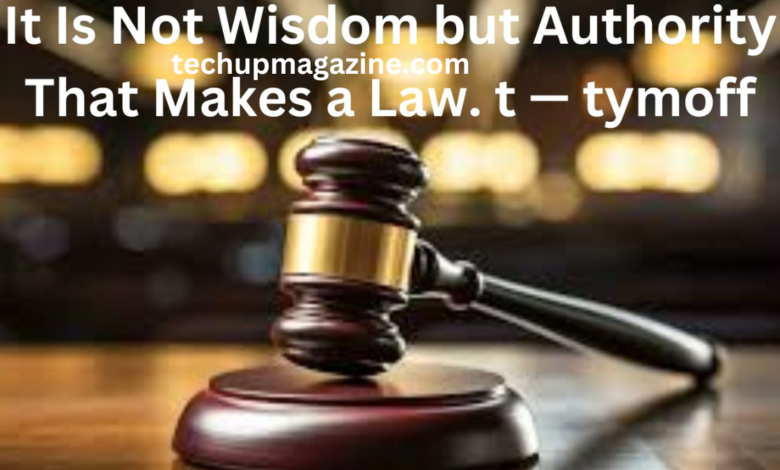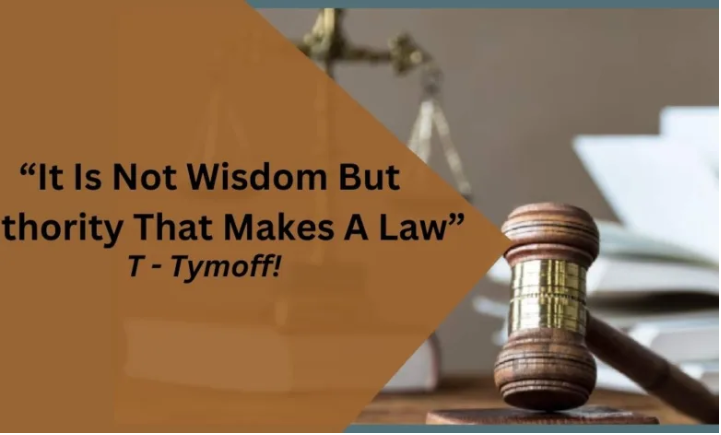Exploring the Power of Authority Over Wisdom in Law: A Deep Dive into “it is not wisdom but authority that makes a law. t – tymoff”

Introduction to the Concept: Understanding Authority Over Wisdom in Law
it is not wisdom but authority that makes a law. t – tymoff is often viewed as a cornerstone of order in society, but the principles that shape these laws are complex. In the words “It is not wisdom but authority that makes a law,” there is a profound recognition that while wisdom might inspire ideas about justice or ethics, it’s ultimately authority that formalizes and enforces laws. This statement, attributed to Tymoff, raises crucial questions about the balance between wisdom and power. Are laws genuinely reflective of collective moral values, or do they mostly represent the power of those who enforce them? This question underlines a longstanding debate about the role of authority versus wisdom in shaping laws, justice systems, and the concept of obedience it is not wisdom but authority that makes a law. t – tymoff.
By examining this relationship, we can gain a clearer understanding of why laws often seem rigid or disconnected from the moral considerations of wisdom. This article explores how authority drives the creation and enforcement of law, the consequences of prioritizing authority over wisdom, and the philosophical and societal implications of Tymoff’s observation it is not wisdom but authority that makes a law. t – tymoff.
The Role of Authority in Shaping Law

it is not wisdom but authority that makes a law. t – tymoff In any society, authority exists as a powerful influence over the legal system. Authority can be defined as the recognized power or right to make decisions, enforce obedience, and manage a community or group. Laws often emerge from a centralized figure or group holding authority, such as a government, a monarchy, or a judicial system. This authority wields the power to define acceptable and unacceptable behavior within a society and to impose consequences for breaking these boundaries it is not wisdom but authority that makes a law. t – tymoff.
This centralized nature of authority means that the law often reflects the interests and judgments of those in power. Even though the process might incorporate feedback from advisors or representatives, the ultimate authority decides. Thus, laws may serve the interests of a specific group rather than an objective or universal wisdom. In practice, this has led to a variety of outcomes, from fair systems aimed at equality to oppressive regimes that prioritize maintaining power it is not wisdom but authority that makes a law. t – tymoff.
In this context, wisdom may guide or advise authority, but it is not the final determinant. The effectiveness and justness of laws depend largely on how authority is exercised and whether it considers the impact on all individuals within a society. Tymoff’s assertion suggests that regardless of the wisdom that might exist in society, authority will often override it when formalizing laws, making authority the real power behind the law it is not wisdom but authority that makes a law. t – tymoff.
How Wisdom is Sidelined in Favor of Authority
While wisdom encompasses knowledge, understanding, and insight, its role in the formation of laws is limited by the structure of authority. Wisdom may point out the ethical implications of certain actions, suggest empathetic approaches, or provide a nuanced perspective on complex issues. However, in a system where authority is paramount, wisdom’s role is often advisory rather than decisive it is not wisdom but authority that makes a law. t – tymoff.
There are many historical and contemporary examples where wisdom-based suggestions or moral pleas have been ignored in favor of authority-based decisions. Wisdom, after all, cannot enforce itself; it lacks the institutional power to be enacted unless an authoritative body or person decides to do so. For instance, many ethical thinkers and philosophers have long argued for equality, compassion, and justice, yet laws do not always reflect these values directly. Authority, with its imperative to maintain control, may place a higher value on order, compliance, and stability over what wisdom deems fair or humane it is not wisdom but authority that makes a law. t – tymoff.
This lack of reliance on wisdom is one of the reasons that societies may sometimes see laws that seem out of sync with progressive or compassionate ideas. Laws that lack wisdom-based considerations may appear harsh, outdated, or even unethical to the average person, leading to tension between the populace and the enforcing authorities it is not wisdom but authority that makes a law. t – tymoff.
Authority and the Enforceability of Law
One of the primary reasons authority holds sway over wisdom in the creation of laws is because authority has the means to enforce these laws. Authority is equipped with the tools, personnel, and legal frameworks to uphold its decisions, making it the engine that drives compliance. In contrast, wisdom, as valuable as it might be in proposing solutions, lacks enforceable power. Wisdom can inspire individuals to act ethically or think critically, but without the authority to enforce these ideas, they remain aspirational rather than obligatory it is not wisdom but authority that makes a law. t – tymoff.
The state, for example, has the military, police force, and judiciary at its disposal to ensure adherence to laws, even those that may be contested or controversial. This power to enforce obedience is a significant factor in why authority, rather than wisdom, makes a law. Law enforcement, in this sense, is not just about the rules themselves but about the authority that upholds them. The government does not necessarily require public consensus if it has the means to enforce compliance it is not wisdom but authority that makes a law. t – tymoff.
This dynamic underscores why laws that may lack ethical wisdom or social approval can still be enforced successfully. The authority behind the law has the mechanisms and resources to command obedience, making authority essential for any rule or regulation to be effective within society it is not wisdom but authority that makes a law. t – tymoff.
The Philosophical Underpinnings: Wisdom vs. Authority
The tension between wisdom and authority has deep roots in philosophy, with figures like Plato, Aristotle, and Hobbes each weighing in on the subject. Plato, for example, argued for a “philosopher-king,” someone who possesses both wisdom and authority, as the ideal ruler. In his view, authority without wisdom would lead to tyranny, while wisdom without authority would be impotent. This balance, however, is seldom seen in practice it is not wisdom but authority that makes a law. t – tymoff.
Most political systems and legal frameworks prioritize authority, viewing it as necessary to maintain order and security. This approach follows the philosophy of thinkers like Hobbes, who argued that a strong, centralized authority is crucial for avoiding chaos and violence. To Hobbes, authority was paramount because it could curb the destructive tendencies of human nature. From this perspective, the wisdom of the law is secondary to its capacity to provide stability it is not wisdom but authority that makes a law. t – tymoff.
This philosophical backdrop helps explain why societies often allow authority to override wisdom when making laws. In many cases, authority is seen as a “necessary evil” to ensure the protection and organization of society, even if it sometimes conflicts with higher ethical considerations. The trade-off, unfortunately, can lead to laws that seem more about control than about promoting true justice or morality it is not wisdom but authority that makes a law. t – tymoff.
Practical Implications of Prioritizing Authority
When authority is prioritized over wisdom in lawmaking, practical consequences often emerge. One immediate result is the potential alienation or disillusionment of the public, who may feel that laws are imposed upon them without a fair hearing of ethical or moral considerations. This can lead to a decrease in public trust in governmental or judicial institutions, as individuals perceive that laws serve authority figures rather than the collective good it is not wisdom but authority that makes a law. t – tymoff.
Moreover, prioritizing authority can sometimes result in rigid and inflexible legal systems. Laws that do not take wisdom into account may fail to adapt to new circumstances, emerging social issues, or ethical evolutions within a society. A law created purely from an authoritative stance may be effective in maintaining order but ineffective in achieving justice, compassion, or social progress. Over time, this may create a legal environment where obedience is valued over critical thought and where questioning authority becomes a social taboo, stifling growth and innovation it is not wisdom but authority that makes a law. t – tymoff.
In this way, the prioritization of authority can stymie societal progress and lead to systems where people feel trapped within laws that do not reflect current ethical or social values. This disconnect may also inspire movements or protests that seek to amend or replace outdated or harsh laws, as individuals advocate for a system that balances authority with wisdom it is not wisdom but authority that makes a law. t – tymoff.
Wisdom as a Guiding Principle in Lawmaking
Despite the limitations placed on wisdom by authority, there is still a strong case for integrating wisdom as a guiding principle in lawmaking. Wisdom brings a dimension of empathy, foresight, and ethical consideration that authority alone often lacks. When laws are created with wisdom in mind, they are more likely to resonate with the public, as they reflect the moral and ethical values shared by society it is not wisdom but authority that makes a law. t – tymoff.
Laws inspired by wisdom are more likely to adapt to social changes and better meet the needs of individuals. A wise law is one that not only regulates but also uplifts, guides, and considers the broader impacts on humanity and the environment. In a system where wisdom informs authority, the result is a more humane and equitable legal structure that aims not just to control but to promote the well-being of the populace.
Some countries and cultures attempt to integrate wisdom into their legal frameworks through advisory councils, ethics boards, or consultative processes that engage diverse voices. Although authority still holds the final decision-making power, the influence of wisdom in these cases can lead to laws that are fairer, more just, and reflective of the common good.
Conclusion: Balancing Authority and Wisdom for a Just Legal System
In conclusion, Tymoff’s statement, “It is not wisdom but authority that makes a law,” highlights the inherent tension between power and ethics in the world of lawmaking. Authority gives laws their strength, enforceability, and permanence, but without wisdom, these laws may lack compassion, understanding, and alignment with societal values. This creates a complex balance for any society aiming to create a just and progressive legal framework.
While authority is necessary for maintaining order, wisdom provides a moral compass that helps guide authority toward fairer outcomes. By finding ways to incorporate wisdom into the legal process, societies can strive toward systems that not only command obedience but also earn respect and admiration from those they govern. The ultimate challenge remains in finding that delicate balance between authority and wisdom to create laws that are both powerful and just.
You may also read
kelly bates asks supporters not to take out their anger on nbc 10
ed sheeran details the lovestruck jitters in sweet new single




